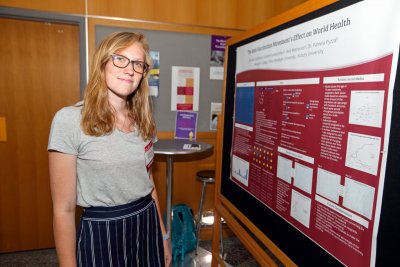SSRP Abstract
The Anti-Vaccination Movement’s Effect on World Health
 Students: Michelle de Oliveira (Wheaton College), Natalie Huebschman ’21, and Reid Matheison (Asbury University)
Students: Michelle de Oliveira (Wheaton College), Natalie Huebschman ’21, and Reid Matheison (Asbury University)
Research Mentor: Pamela Pyzza (OWU Department of Mathematics and Computer Science)
Measles is a highly contagious viral infection that, after being labeled “eradicated” by the CDC in 2000, has resurfaced with a growing number of cases due to the increasing amount of parents refusing to vaccinate their children. A feature contributing to unvaccinated cases are online communities popularizing the idea that vaccines increase a child's likeliness of developing autism. To further investigate the link between anti-vaccination ideology and the physical spread of measles through a population, we developed a mathematical model. MATLAB was utilized to build an Agent-Based Network of individuals with unique characteristics. Each is connected to others of a similar age range for the work week and four other individuals during the weekend to represent school and familial interactions respectively. Using these connections, measles is spread throughout the population-based on connecting an individual’s disease status. Whether an individual is vaccinated or affected by the disease depends predominantly on how the anti-vaccination ideas spread through the social media platform. This model provides the foundation for further research on how these ideas can affect different societies based on different geographical, social, or age-based relationships.
In this project we modeled the spread of ideas and how that affected the spread of measles throughout a community. To do this we used a software called MATLAB to create a mathematical model. Using this model we hope to be able to answer some questions about what might cause outbreaks and how it might be possible to contain these outbreaks.
